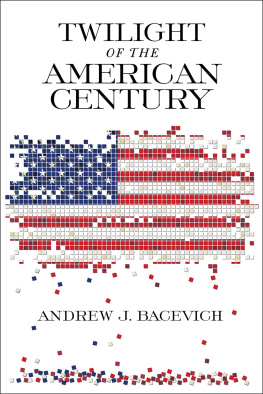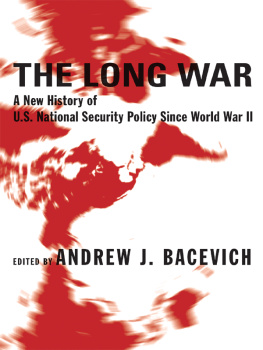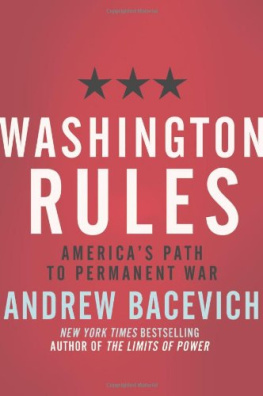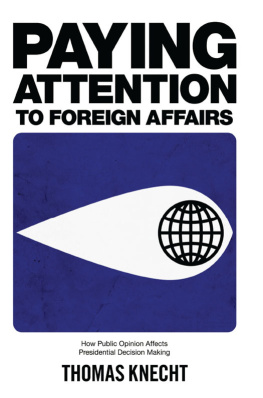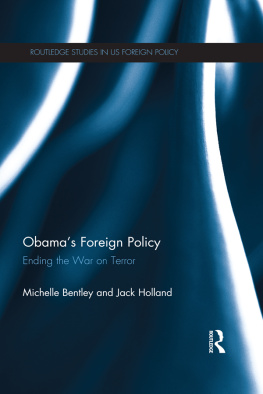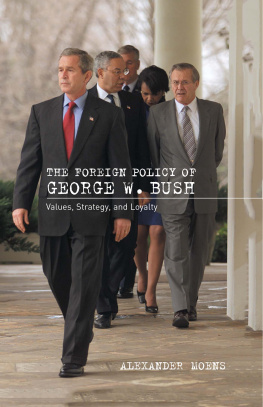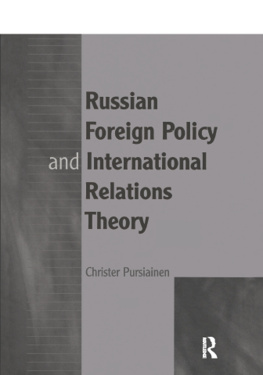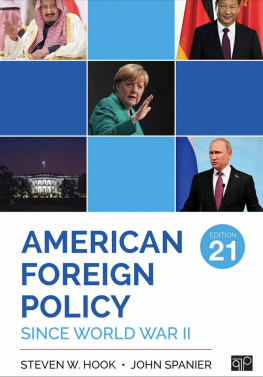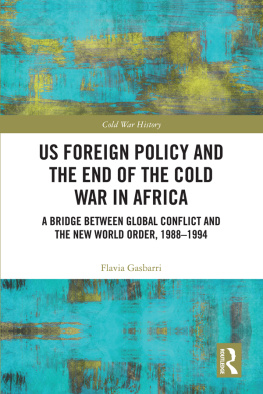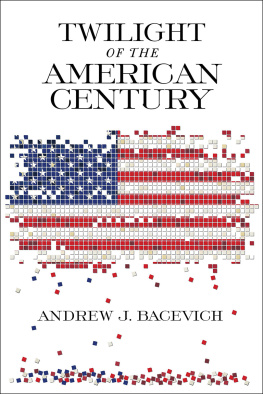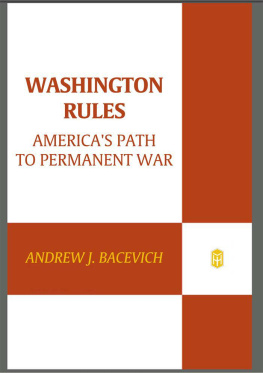Twilight of the American Century
TWILIGHT
OF THE
AMERICAN
CENTURY
ANDREW J. BACEVICH
University of Notre Dame Press
Notre Dame, Indiana
University of Notre Dame Press
Notre Dame, Indiana 46556
undpress.nd.edu
All Rights Reserved
Copyright 2018 by Andrew J. Bacevich
Published in the United States of America
Library of Congress Cataloging-in-Publication Data
Names: Bacevich, Andrew J., author.
Title: Twilight of the American century / Andrew J. Bacevich.
Description: Notre Dame, Indiana : University of Notre Dame Press, [2018] |
Includes index. |
Identifiers: LCCN 2018021921 (print) | LCCN 2018040612 (ebook) | ISBN 9780268104870 (pdf) | ISBN 9780268104887 (epub) | ISBN 9780268104856 | ISBN 9780268104856 (hardback : alk. paper) | ISBN 0268104859 (hardback : alk. paper) | ISBN 9780268104863 (paperback : alk. paper) | ISBN 0268104867 (paperback : alk. paper)
Subjects: LCSH: United StatesPolitics and government21st century.
Classification: LCC E902 (ebook) | LCC E902.B33 2018 (print) | DDC 320.973/0905dc23
LC record available at https://lccn.loc.gov/2018021921
This paper meets the requirements of ANSI/NISO Z39.48-1992 (Permanence of Paper).
This e-Book was converted from the original source file by a third-party vendor. Readers who notice any formatting, textual, or readability issues are encouraged to contact the publisher at
To Steve Brown, Tom Engelhardt, and John Wright
Irrepressible New Yorkers,
Irreplaceable Friends
Jerusalem has sinned grievously; therefore, she has become an object of scorn.
All who honored her now despise her, for they have seen her nakedness.
Lamentations, chapter 1, verse 8
Contents
Introduction
Straying from the Well-Trod Path
Everyone makes mistakes. Among mine was choosing at age seventeen to attend the United States Military Academy, an ill-advised decision made with little appreciation for any longer-term implications that might ensue. My excuse? I was young and foolish.
Yet however ill-advised, the decision was all but foreordained. At least so it appears to me in retrospect. Family background, upbringing, early schooling: all of these, along with the time and place of my birth, predisposed me to choose West Point in preference to the civilian schools to which I had applied. Joining the Corps of Cadets in the summer of 1965 was a logical culmination of my lifes trajectory to that point.
West Point exists for one reason only: to produce soldiers. Not all graduates become career military officers, of course. Many opt out after a few years of service and retool themselves as lawyers, bankers, business executives, stockbrokers, doctors, dentists, diplomats, and the like. But the nation doesnt need federally funded service academies to fill the ranks of these occupations. For such purposes, Americas multitude of colleges and universities, public and private, more than suffice.
My alma mater isor at least wasa different sort of place. At the West Point I attended, education per se took a backseat to socialization. As cadets we studied the arts and sciences, thereby absorbing knowledge much like our peers at Ohio State or Yale. Yet mere learning was not the object of the exercise. West Points true purpose was to inculcate a set of values and a worldview, nominally expressed in the academys motto Duty, Honor, Country.
Virtually all institutional mottosGoogles now-defunct Dont be evil offers a good examplecontain layers of meaning. Apparent simplicity conceals underlying ambiguity, which only the fully initiated possess the capacity to decipher.
Embedded in West Points motto are two mutually reinforcing propositions that we aspiring professional soldiers were expected to absorb. According to the first, the well-being of the United States as a whole is inextricably bound up with the well-being of the United States Army. Much as Jesuits believe that the Society of Jesus not only defends but also embodies the Faith, so too does West Point inculcate into its graduates the conviction that the army not only defends but also embodies the nation. To promote the armys interests is therefore to promote the national interest and, by extension, all that America itself signifies.
According to the second proposition, individual standing within the military profession is a function not of what you are doing but of who you give evidence of becoming. Upward trajectory testifies to your potential for advancing the armys interests. In this regard, promotabilityprospects for ascending the hierarchy of rank and positionbecomes the ultimate measure of professional status. Thus does the code of professional values incorporate and indeed foster personal ambition and careerism.
I was, to put it mildly, slow to grasp the tension between the values that West Point professed and those that it actually imparted. Appreciating the contradictions would have required critical faculties that in my passage from adolescence to adulthood I did not possess. After all, I was not given to questioning institutional authority. Indeed, my instinct was to defer to institutions and to take at face value the word handed down from podium, pulpit, or teachers desk, whatever that word might be. Spending four years at West Point powerfully reinforced that tendency.
Born during the summer of 1947 in Normal, Illinois, of all places, I was, as it were, marked from the outset with the sign of orthodoxy. From an early age, as if by instinct, I deferred to convention, as I was brought up to do.
My roots are in Chicagoland, the great swathe of the Midwest defined by the circulation area of Colonel Robert McCormicks Chicago Tribune, which in those days proclaimed itself the Worlds Greatest Newspaper. My father, the son of Lithuanian immigrants, had grown up in East Chicago, Indiana, a small, charmless city known chiefly as the home of the now-defunct Inland Steel. My mother came from an undistinguished farm town situated alongside the Illinois River, a hundred miles from the Windy City. Both of my parents were born in the early 1920s, both were cradle Catholics, and both were veterans of World War II. Within a year of returning from overseas once the war ended, they had met, fallen in love, and married. Theirs was a perfect match. Eleven months later, with my father now enrolled in college courtesy of the G.I. Bill, I arrived on the scene.
Ours was an upwardly mobile family at a moment when opportunities for upward mobility were plentiful, especially for white Americans willing to work hard. And ours was a traditional familymy Dad as breadwinner, my Mom as housewifeat a time when such arrangements seemed proper, natural, and destined to continue in perpetuity.
After my father graduated from college and then from medical schoolyears during which my parents struggled financiallywe returned to East Chicago and began our ascent into a comfortable middle-class existence: a small home, then a bigger one; first one car, then two; black-and-white TV, then color; lakeside summer vacations in Wisconsin; a single sibling, and eventually a houseful. Big families were the order of the day, especially among Catholics. That within the confined spacing defining our existence, things occurred as they were meant to occur was a proposition that I accepted without question. This was, after all, the 1950s.
I attended the local parochial school, staffed by the Poor Handmaids of Jesus Christ, and committed to memory the Baltimore Catechism, as required. Upon finishing eighth grade, I was off to an all-boys Benedictine high school situated among the cornfields of Illinois, the very school that my father had attended back in the 1930s. I was a boarding student and here commenced a long journey away from home, even though in some indefinable sense I was to remain a son of the Middle Border.
Next page
